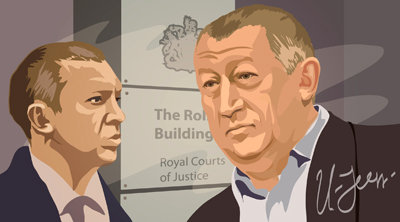LONDON, September 28 - RAPSI. The owner of Russian aluminum giant RUSAL Oleg Deripaska confirmed Thursday that oligarch Mikhail Cherney's claim against him had been dropped, but both parties remain silent as to the details.
The trial had been scheduled to resume on Thursday. Cherney had previously been expected to testify via video link in court this week. He sought compensation from Deripaska over an aluminum deal made in the 1990s.
However, at the last moment, the hearing was postponed until October 2. The High Court of Justice declined to give the reason for the delay.
According to Russian media reports on Thursday, the hearing may have been rescheduled in connection with the parties reaching a settlement.
In regard to an agreement allegedly concluded in London in 2001, Cherney sought compensation in the amount of 20% of the value of the Russian Aluminum Company, RUSAL's early prototype. He claimed that the agreement dealt with the transfer in trust of Cherney's shares in the company to Deripaska with a commitment to pay for the transfer in three to five years.
Deripaska in turn claimed that Cherney's allegations are baseless and that they had never been business partners. The calculations made and the signatures rendered between them more than a decade ago were merely a cover for a "krysha" agreement. Krysha is a term for an illegal form of protection offered by criminal groups to businesses and their officials. These protection agreements were common practice in the Russian business world of the 1990s. In refuting his claims, Deripaska noted Cherney's deeply rooted criminal connections.
The trial was expected to go on for several months, hearing testimonies from around 20 witnesses for the plaintiff and over 40 for the defendant.
Experts believe the outcome could have been influenced by the judgment in the litigation between two other Russian businessmen - Boris Berezovsky and Roman Abramovich. Berezovsky had requested compensation for the assets which he was allegedly forced to sell to Abramovich between 2000 and 2003, shortly after his flight from prosecution in Russia. Berezovsky claimed that Abramovich had intimidated him and his business partner Badri Patarkatsishvili into selling a number of assets, including a 43 percent interest in the Sibneft oil company and a stake in the RUSAL aluminum group at a fraction of their value.
Berezovsky sought $5.5 billion in damages.
The High Court of Justice in London ruled against Berezovsky in August and confirmed the existence of the concept of the "krysha" system in Russia in the 1990s.
Deripaska, who welcomed the legal recognition of the "krysha" system, was a witness for Abramovich at the trial.



